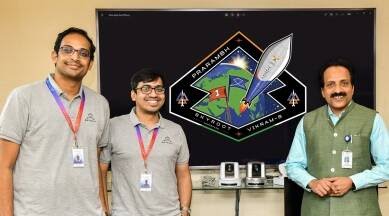
Between November 12 and November 16, India’s first independently developed launch vehicle is scheduled to launch from the Sriharikota launchpad of the Indian Space Research Organization (ISRO). The launch vehicle, nicknamed “Vikram,” will carry two Indian and one international client payloads on the mission, “Prarambh,” of Hyderabad-based Skyroot Aerospace.
According to Skyroot Aerospace CEO and co-founder Pawan Kumar Chandana, “a launch window between November 12 and 16 has been notified by authorities, with the exact date being verified based on weather conditions.”
The successful launch of Vikram will be a significant milestone for India’s space exploration industry. Actually, according to Skyroot’s website, “Launching satellites to space will soon become as easy as booking a cab – Quick, precise, and economical! ‘
How would Vikram help achieve this challenging objective? What distinguishes the rocket from others? And why is it even necessary to deploy so many satellites? We clarify.
What is Mission Prarambh exactly?
Three customer satellites will be transported in a sub-orbital flight by Vikram-S over Prarambh. Jeff Bezos and Richard Branson have flown sub-orbitally, which is slower than orbital velocity and fast enough to get them to space but not fast enough to keep them in an orbit around the Earth.
According to Naga Bharath Daka, COO and co-founder of the business, “The Vikram-S rocket is a single-stage sub-orbital launch vehicle that will transport three client payloads and help test and validate technology in the Vikram series space launch vehicles.”
Additionally, ‘Fun-Sat,’ a 2.5 kg payload created by kids from India, the US, Singapore, and Indonesia, will be launched on Vikram-S by Spacekidz, an aerospace firm located in Chennai.
Vikram’s features
As reported by PTI, Skyroot was the first startup to sign a memorandum of understanding with ISRO for launching its rockets. Its launch vehicles have been crafted specially for the small satellite market, and are named ‘Vikram’ as a tribute to Vikram Sarabhai, founder of the Indian space programme. They come in three forms, Vikram I, II, and III.
According to Skyroot, ‘More than 20,000 small satellites are estimated to be launched in the coming decade, and Vikram series is designed to enable this through unprecedented mass producibility and affordability. The leading technology architecture of Vikram vehicles offers unique capabilities like multi-orbit insertion, interplanetary missions; while providing customised, dedicated and ride share options covering a wide spectrum of small satellite customer needs.’
A Vikam rocket, according to Skyroot, has the “lowest cost in the payload segment” and can be built and launched in less than 24 hours from any launch location.
The need for satellite launch vehicles like Vikram
As The Indian Express has noted, for a very long time, small satellites—anything weighing between 5 and 1,000 kg—had to make due with sharing a rocket’s launch with other, larger spacecraft.
This larger primary satellite, whose needs would take precedence, would determine the launch schedule. The limitations of a piggyback trip, however, have begun to bite as more and more corporations, governmental organisations, even universities and laboratories, start to send satellites — practically all of them belonging in this category of small satellites — to orbit.
Small satellite launches have been increasingly popular during the last eight to ten years as a result of the expanding need for space-based data, communication, surveillance, and commerce. Today, satellite data, images, and space technology are required in a wide range of industries, including meteorology, agriculture, transportation, and urban development.
In India
Given that the space agency also needs to focus on other, more important objectives, demand for ISRO’s satellite launch services in India is quickly outpacing its capability. The industry is now accessible to private operators, with ISRO providing them with resources and expertise. Facilities use may be fee-based, generating income for ISRO.
‘We could build and get our Vikram-S rocket mission ready in such a short time only because of the invaluable support we received from ISRO and IN-SPACe (Indian National Space Promotion and Authorisation Centre), and the technology talent that we inherently possess,’ said Chandna, CEO of Skyroot, on Tuesday.
Additionally, as part of a Memorandum of Understanding (MoU) between the two parties, the Vikram Sarabhai Space Centre (VSSC), the ISRO’s principal facility for the production of launch vehicles, enabled the hot testing of a rocket engine on November 4.
The Thumba Equatorial Rocket Launching Station (TERLS) in Thiruvananthapuram’s Vertical Test Facility is where VSSC successfully completed the 15-second hot test of the Agnilet Engine.










